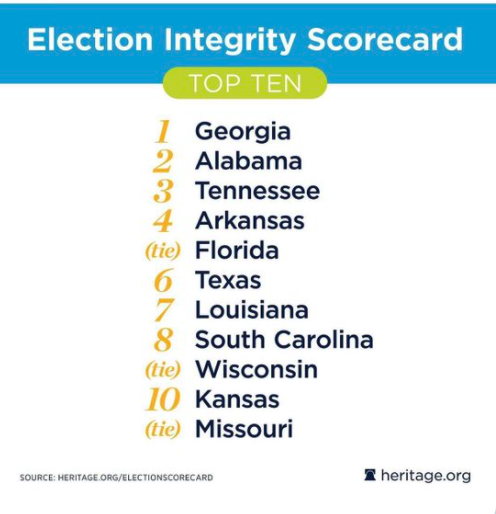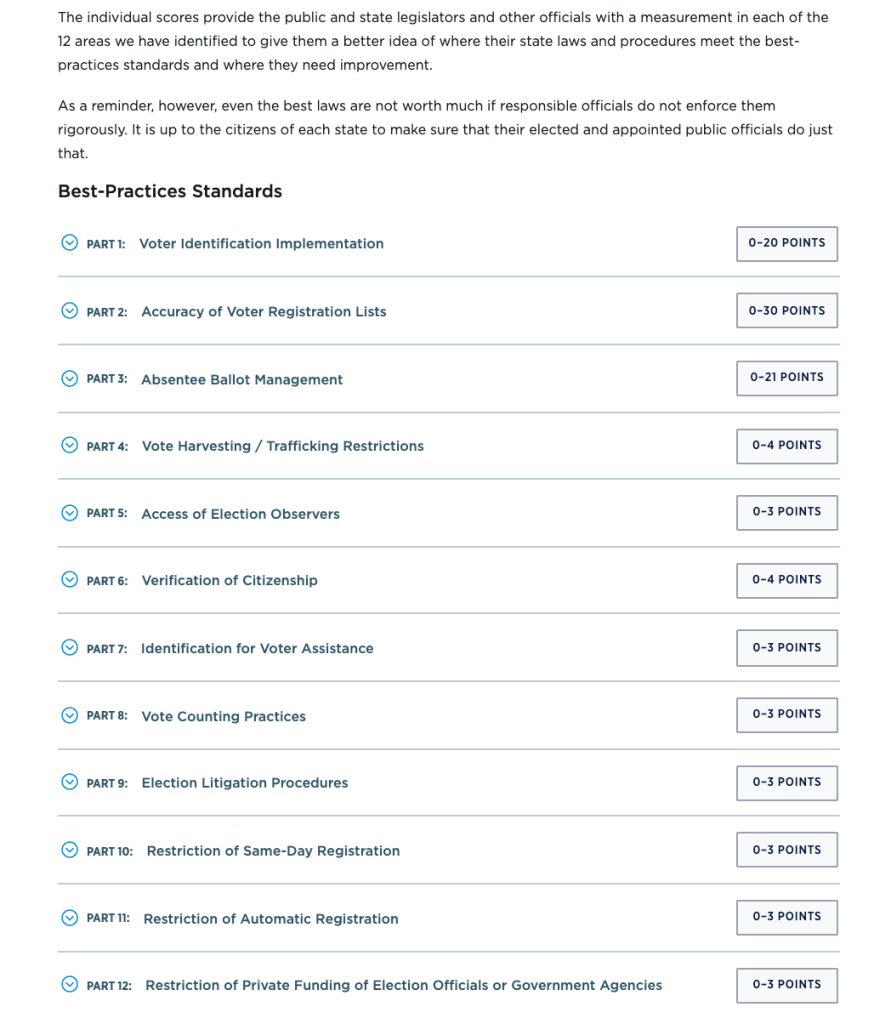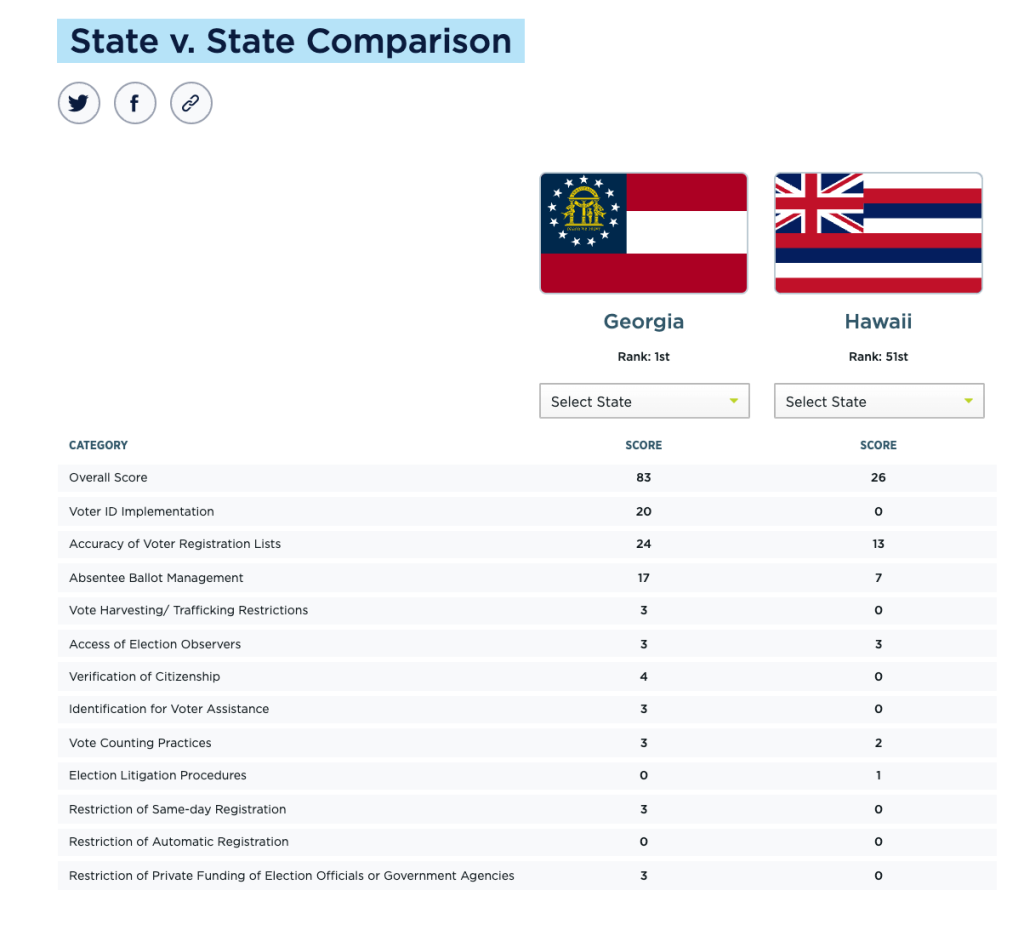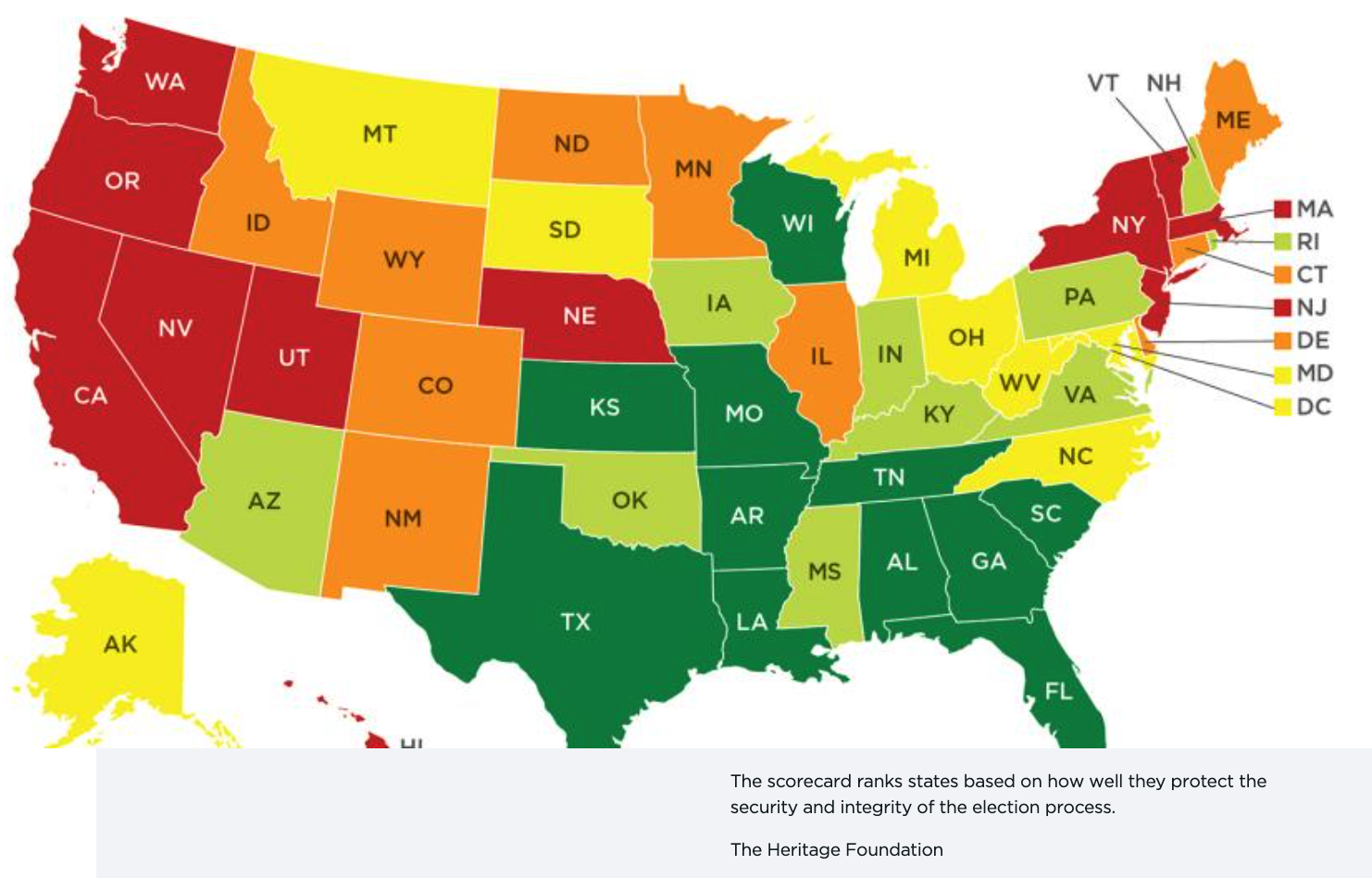The Heritage Foundation published a state-by-state election integrity scorecard, placing Georgia at number one with a score of 83 on a scale of 100. Hawaii ranks dead last in the 51st spot with a score of 26. Heritage included the District of Columbia in the survey because it has three electoral votes. No state received 100 points. The site evaluates state election laws that are currently on the books.
 Top Ten/Election Integrity Laws by State/Heritage.org
Top Ten/Election Integrity Laws by State/Heritage.org
On Thursday, the Who's Counting website featured a podcast on the survey with election law expert Hans von Spakovsky.
Spakovsky made it clear on the podcast that this scorecard looks at laws not compliance with the laws, a big distinction that some may misunderstand when they visit the site. Spakovsky explained:
"This is not a performance scorecard. You know, we very prominently say on the first page that the best laws and regulations in the world aren't going to do any good if election officials are not complying with those laws or not enforcing them. But it's hard to come up with objective criteria to judge that.
This [scorecard] is showing what the laws and regulations are. On the other hand, this will give state legislators and the folks at the grassroots level the tools to make sure that their local election officials are actually doing what they should be doing complying with the law."
The conservative foundation judged state election integrity with twelve different measures:
- Voter ID implementation
- Accuracy of Voter Registration Lists
- Absentee Ballot Management
- Vote Harvesting/Trafficking Restrictions
- Access of Election Observers
- Verification of Citizenship
- Identification for Voter Assistance
- Vote Counting Practices
- Election Litigation Procedures
- Restriction of Same-day Registration
- Restriction of Automatic Registration
- Restriction of Private Funding of Election Officials or Government Agencies
Partnering with election experts and their legal center, Heritage developed a rating system based on the laws of "every single state." They also came up with a "set of best practices for what we think those laws should be." Heritage explains in its Dec. 23 press release:
"The grading system in the scorecard is based on an in-depth analysis of the specific election laws in each state. The Heritage Foundation provided individual scores in 12 different areas essential to honest, secure elections, with a final score based on a compilation of the individual scores for each best-practice recommendation. The scorecard will be updated on a rolling basis as states make changes to their election laws."
Leaders in the organization explain that 2020 was a year where election and state officials "ignored" best practices and election laws "under the guise of the pandemic." More importantly, the site states that Americans have been misled by those who continue to promote "unwise policies such as automatic and same-day voter registration, ballot trafficking, and banning voter ID laws. These policies serve only one purpose—giving bad actors an avenue to cheat." Their voter fraud page highlights "a sampling of election fraud cases" nationwide.
The site shows the grading system for the twelve items shown in the graphic captured from the site below:
 Scoring/Heritage.org
Scoring/Heritage.org
The top three categories are weighted heavily because Heritage believes those are the categories that are the most likely to influence the election outcome. According to Rasmussen, Americans place more importance on "preventing cheating than on making it easier to vote."
The site offers the ability to look at election integrity by state, and users can also plug in two states side by side to compare scores. Below is a comparison with Georgia, which is currently number one, and Hawaii, which ranks 51st.
 Georgia v Hawaii/Election Integrity/Heritage.org
Georgia v Hawaii/Election Integrity/Heritage.org
There is also downloadable information provided for model legislation for 11 categories. That information is also accessible on the website itself by clicking the category of interest.
 Model Legislation/Heritage
Model Legislation/Heritage
Sponkovsky mentioned the perils of allowing private organizations to pick up ballots and manage elections. As previously reported by UncoverDC, the Zuckerberg-Chan initiative did just that through Center for Civic and Tech Life (CTCL) partnerships, as in the case of Wisconsin and other key swing states.
On Thursday, Rasmussen published a scathing poll on how Americans currently view what happened in the 2020 election. Cited by Seth Keshel on his telegram channel, it seems that Americans' trust in elections has eroded significantly.
"41% of DEMS now believe 2020 was a fraud. Up from 34%. This likely means the minority working class is coming awake - doubt it's the double mask white liberals."
"59% overall. Reaching near what I would consider apogee point (60-65%)."
"Truly an incredible number. No Republic can survive 3/5 of the electorate no longer trusting its method of determining its leaders."
On Thursday, Rasmussen tweeted a comparison between its polling on Dec. 10 vs. Dec. 23. It was a survey of Independent/Unaffiliated Voters ONLY.


